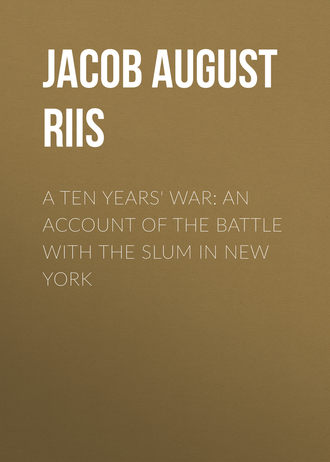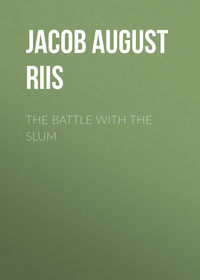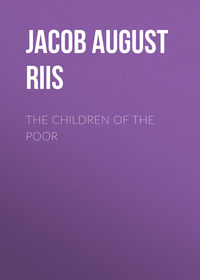 полная версия
полная версияA Ten Years' War: An Account of the Battle with the Slum in New York
And yet, if ever there was material for citizenship, this Jew is such material. Alone of all our immigrants he comes to us without a past. He has no country to renounce, no ties to forget. Within him there burns a passionate longing for a home to call his, a country which will own him, that waits only for the spark of such another love to spring into flame which nothing can quench. Waiting for it, all his energies are turned into his business. He is not always choice in method; he often offends. But he succeeds. He is the yeast of any slum, if given time. If it will not let him go, it must rise with him. The charity managers in London said it, when we looked through their slums some years ago: "The Jews have renovated Whitechapel." I, for one, am a firm believer in this Jew, and in his boy. Ignorant they are, but with a thirst for knowledge that surmounts any barrier. The boy takes all the prizes in the school. His comrades sneer that he will not fight. Neither will he when there is nothing to be gained by it. But I believe that, should the time come when the country needs fighting men, the son of the despised immigrant Jew will resurrect on American soil, the first that bade him welcome, the old Maccabee type, and set an example for all the rest of us to follow.
For fifteen years he has been in the public eye as the vehicle and promoter of sweating, and much severe condemnation has been visited upon him with good cause. He had to do something, and he took to the clothes-maker's trade as that which was most quickly learned. The increasing crowds, the tenement, and his grinding poverty made the soil, wherein the evil thing grew rank. Yet the real sweater is the manufacturer, not the workman. It is just a question of expense to the manufacturer. By letting out his work on contract, he can save the expense of running his factory and delay longer making his choice of styles. The Jew is the victim of the mischief quite as much as he has helped it on. Back of the manufacturer there is still another sweater,—the public. Only by its sufferance of the bargain counter and of sweatshop-made goods has the nuisance existed as long as it has. I am glad to believe that its time is passing away. The law has driven the sweatshops out of the tenements, and so deprived them of one of their chief props: there was no rent at all to pay there. Child labor, which only four years ago the Reinhard Committee characterized as "one of the most extensive evils now existing in the city of New York, a constant and grave menace to the welfare of its people," has been practically banished from the tailoring trade. What organization among the workers had failed to effect is apparently going to be accomplished by direct pressure of an outraged public opinion. Already manufacturers are returning to their own factories, and making capital of the fact among their customers. The new law, which greatly extends the factory inspector's power over sweatshops, is an expression of this enlightened sentiment. It will put New York a long stride ahead, and quite up to Massachusetts. The inspector's tag has proved, where the law was violated, an effective weapon. It suspends all operation of the shop and removal of the goods until the orders of the inspector have been obeyed. But the tag which shall finally put an end to sweating, and restore decent conditions, is not the factory inspector's, I am persuaded, but a trades union label, which shall deserve public confidence and receive it. We have much to learn yet, all of us. I think I can see the end of this trouble, however, when the Italian's triumph in the sweatshop shall have proved but a barren victory, to his own gain.
In all I have said so far, in these papers, I have not gone beyond the limits of the old city,—of Manhattan Island, in fact. I want now to glance for a moment at the several attempts made at colonizing refugee Jews in this part of the country. Brownsville was one of the earliest. Its projector was a manufacturer, and its motive profit. The result was the familiar one,—as nasty a little slum as ever the East Side had to show. We have it on our hands now in the Greater City,—it came in with Brooklyn,—and it is not a gain. Down in southern New Jersey several colonies were started, likewise by speculators, in the persecution of the early eighties, and these also failed. The soil was sandy and poor, and, thrown upon their own resources in a strange and unfriendly neighborhood, with unfamiliar and unremunerative toil, the colonists grew discouraged and gave up in despair. The colonies were approaching final collapse, when the managers of the Baron de Hirsch Fund in New York, who had started and maintained a successful colony at Woodbine, in the same neighborhood, took them under the arms and inaugurated a new plan. They persuaded several large clothing contractors in this city to move their plants down to the villages, where they would be assured of steady hands, not so easily affected by strikes. For strikes in sweatshops are often enough the alternative of starvation. Upon the land there would be no starvation. The managers of the Fund built factories, bought the old mortgages on the farms, and put up houses for the families which the contractors brought down with them. This effort at transplanting the crowd from the Ghetto to the soil has now been going on for a year. At latest account, eight contractors and two hundred and fifty families had been moved out. The colonies had taken on a new lease of life and apparent prosperity. While it is yet too early to pass sober judgment, there seems to be good ground for hoping that a real way out has been found that shall restore the Jew, at least in a measure, to the soil from which he was barred so long. The experiment is of exceeding interest. The hopes of its projectors that a purely farming community might be established have not been realized. Perhaps it was too much to expect. By bringing to the farmers their missing market, and work to the surplus population, the mixed settlement plan bids fair to prove a step in the desired direction.
Some 18,500 acres are now held by Jewish colonists in New Jersey. In the New England States, in the last eight years, 600 abandoned farms have been occupied and are cultivated by refugees from Russia. As a dairy farmer and a poultry raiser, the Jew has more of an immediate commercial grip on the situation and works with more courage. At Woodbine, sixty-five boys and girls are being trained in an agricultural school that has won the whole settlement the friendly regard of the neighborhood. Of its pupils, eleven came out of tailor shops, and ten had been office boys, messengers, or newsboys. To these, and to the trade schools now successfully operated by the de Hirsch Fund, we are to look in the next generation for the answer to the old taunt that the Jew is a trader, and not fit to be either farmer or craftsman, and for the solution of the problem which he now presents in the slum.
I have spoken at length of the Jew and the Italian, because they are our present problem. Yesterday it was the Irishman and the Bohemian. To-morrow it may be the Greek, who already undersells the Italian from his pushcart in the Fourth Ward, and the Syrian, who can give Greek, Italian, and Jew points at a trade. From Dalmatia a new immigration has begun to come, and there are signs of its working further east in the Balkan states, where there is no telling what is in store for us. How to absorb them all safely is the question. Doubtless the Irishman, having absorbed us politically, would be glad to free us from all concern on that score by doing a like favor for them. But we should not get the best of the slum that way; it would get the best of us, instead. Would I shut out the newcomers? Sometimes, looking at it from the point of view of the Barge Office and the sweatshop, I think I would. Then there comes up the recollection of a picture of the city of Prague that hangs in a Bohemian friend's parlor, here in New York. I stood looking at it one day, and noticed in the foreground cannon that pointed in over the city. I spoke of it, unthinking, and said to my host that they should be trained, if against an enemy, the other way. The man's eye flashed fire. "Ha!" he cried, "here, yes!" When I think of that, I do not want to shut the door.
Again, there occurs to me an experience the police had last summer in Mulberry Street. They were looking for a murderer, and came upon a nest of Italian thugs who lived by blackmailing their countrymen. They were curious about them, and sent their names to Naples with a request for information. There came back such a record as none of the detectives had ever seen or heard of before. All of them were notorious criminals, who had been charged with every conceivable crime, from burglary to kidnapping and "maiming," and some not to be conceived of by the American mind. Five of them together had been sixty-three times in jail, and one no less than twenty-one times. Yet, though they were all "under special surveillance," they had come here without let or hindrance within a year. When I recall that, I want to shut the door quick. I sent the exhibit to Washington at the time. But then, again, when I think of Mrs. Michelangelo in her poor mourning for one child run over and killed, wiping her tears away and going bravely to work to keep the home together for the other five until the oldest shall be old enough to take her father's place; and when, as now, there strays into my hand the letter from my good friend, the "woman doctor" in the slum, when her father had died, in which she wrote: "The little scamps of the street have been positively pathetic; they have made such shy, boyish attempts at friendliness. One little chap offered to let me hold his top while it was spinning, in token of affection,"—when I read that, I have not the heart to shut anybody out.
Except, of course, the unfit, the criminal and the pauper, cast off by their own, and the man brought over here merely to put money into the pockets of the steamship agent, the padrone, and the mine owner. We have laws to bar these out. Suppose we begin by being honest with ourselves and the immigrant, and enforcing our own laws. In spite of a healthy effort at the port of New York,—I can only speak for that,—under the present administration, that has not yet been done. When the door has been shut and locked against the man who left his country for his country's good, whether by its "assistance" or not, and when trafficking in the immigrant for private profit has been stopped, then, perhaps, we shall be better able to decide what degree of ignorance in him constitutes unfitness for citizenship and cause for shutting him out. Perchance then, also, we shall hear less of the cant about his being a peril to the republic. Doubtless ignorance is a peril, but the selfishness that trades upon ignorance is a much greater. He came to us without a country, ready to adopt such a standard of patriotism as he found, at its face value, and we gave him the rear tenement and slum politics. If he accepted the standard, whose fault was it? His being in such a hurry to vote that he could not wait till the law made him a citizen was no worse, to my mind, than the treachery of the "upper class" native, who refuses to go to the polls for fear he may rub up against him there. This last let us settle with first, and see what remains of our problem. We can approach it honestly, then, at all events.
When the country was in the throes of the silver campaign, the newspapers told the story of an old laborer who went to the sub-treasury and demanded to see the "boss." He undid the strings of an old leathern purse with fumbling fingers, and counted out more than two hundred dollars in gold eagles, the hoard of a lifetime of toil and self-denial. They were for the government, he said. He had not the head to understand all the talk that was going, but he gathered from what he heard that the government was in trouble, and that somehow it was about not having gold enough. So he had brought what he had. He owed it all to the country, and now that she needed it he had come to give it back. The man was an Irishman. Very likely he was enrolled in Tammany and voted her ticket. I remember a tenement at the bottom of a back alley over on the East Side, where I once went visiting with the pastor of a mission chapel. Up in the attic there was a family of father and daughter in two rooms that had been made out of one by dividing off the deep dormer window. It was midwinter, and they had no fire. He was a peddler, but the snow had stalled his pushcart and robbed them of their only other source of income, a lodger who hired cot room in the attic for a few cents a night. The daughter was not able to work. But she said, cheerfully, that they were "getting along." When it came out that she had not tasted solid food for many days, was starving, in fact,—indeed, she died within a year, of the slow starvation of the tenements that parades in the mortality returns under a variety of scientific names which all mean the same thing,—she met her pastor's gentle chiding with the excuse, "Oh, your church has many poorer than I. I don't want to take your money."
These were Germans, ordinarily held to be close-fisted; but I found that in their dire distress they had taken in a poor old man who was past working, and had kept him all winter, sharing with him what they had. He was none of theirs; they hardly even knew him, as it appeared. It was enough that he was "poorer than they," and lonely and hungry and cold.
It was over here that the children of Dr. Elsing's Sunday school gave out of the depth of their poverty fifty-four dollars in pennies to be hung on the Christmas tree as their offering to the persecuted Armenians. One of their teachers told me of a Bohemian family that let the holiday dinner she brought them stand and wait, while they sent out to bid to the feast four little ragamuffins of the neighborhood who else would have gone hungry. I remember well a teacher in one of the Children's Aid Society's schools, herself a tenement child, who, with breaking heart, but brave face, played and sang the children's Christmas carols with them rather than spoil their pleasure, while her only sister lay dying at home.
I might keep on and fill many pages with instances of that kind, which simply go to prove that our poor human nature is at least as robust on Avenue A as up on Fifth Avenue, if it has half a chance, and often enough to restore one's faith in it, with no chance at all; and I might set over against it the product of sordid and mean environment which one has never far to seek. Good and evil go together in the tenements as in the fine houses, and the evil sticks out sometimes merely because it lies nearer the surface. The point is that the good does outweigh the bad, and that the virtues that turn the balance are after all those that make for good citizenship anywhere, while the faults are oftenest the accidents of ignorance and lack of training, which it is the business of society to correct. I recall my discouragement when I looked over the examination papers of a batch of candidates for police appointment,—young men largely the product of our public schools in this city and elsewhere,—and read in them that five of the original New England States were "England, Ireland, Scotland, Belfast, and Cork;" that the Fire Department ruled New York in the absence of the Mayor,—I have sometimes wished it did, and that he would stay away awhile; and that Lincoln was murdered by Ballington Booth. But we shall agree, no doubt, that the indictment of these papers was not of the men who wrote them, but of the school that stuffed its pupils with useless trash, and did not teach them to think. Neither have I forgotten that it was one of these very men who, having failed, and afterward got a job as a bridge policeman, on his first pay day went straight from his post, half frozen as he was, to the settlement worker who had befriended him and his sick father, and gave him five dollars for "some one who was poorer than they." Poorer than they! What worker among the poor has not heard it? It is the charity of the tenement that covers a multitude of sins. There were thirteen in this policeman's family, and his wages were the biggest item of income in the house.
Jealousy, envy, and meanness wear no fine clothes and masquerade under no smooth speeches in the slums. Often enough it is the very nakedness of the virtues that makes us stumble in our judgment. I have in mind the "difficult case" that confronted some philanthropic friends of mine in a rear tenement on Twelfth Street, in the person of an aged widow, quite seventy I should think, who worked uncomplainingly for a sweater all day and far into the night, pinching and saving and stinting herself, with black bread and chicory coffee as her only fare, in order that she might carry her pitiful earnings to her big, lazy lout of a son in Brooklyn. He never worked. My friends' difficulty was a very real one, for absolutely every attempt to relieve the widow was wrecked upon her mother heart. It all went over the river. Yet one would not have had her different.
Sometimes it is only the unfamiliar setting that shocks. When an East Side midnight burglar, discovered and pursued, killed a tenant who blocked his way of escape, a few weeks ago, his "girl" gave him up to the police. But it was not because he had taken human life. "He was good to me," she explained to the captain whom she told where to find him, "but since he robbed the church I had no use for him." He had stolen, it seems, the communion service in a Staten Island church. The thoughtless laughed. But in her ignorant way she was only trying to apply the standards of morality as they had been taught her. Stunted, bemuddled, as they were, I think I should prefer to take my chances with her rather than with the woman of wealth and luxury who, some years ago, gave a Christmas party to her lap-dog, as on the whole the sounder of the two, and by far the more hopeful.
All of which is merely saying that the country is all right, and the people are to be trusted with the old faith in spite of the slum. And it is true, if we remember to put it that way,—in spite of the slum. There is nothing in the slum to warrant that faith save human nature as yet uncorrupted. How long it is to remain so is altogether a question of the sacrifices we are willing to make in our fight with the slum. As yet, we are told by the officials having to do with the enforcement of the health ordinances, which come closer to the life of the individual than any other kind, that the poor in the tenements are "more amenable to the law than the better class." It is of the first importance, then, that we should have laws deserving of their respect, and that these laws should be enforced, lest they conclude that the whole thing is a sham. Respect for law is a very powerful bar against the slum. But what, for instance, must the poor Jew understand, who is permitted to buy a live hen at the market, yet neither to kill nor keep it in his tenement, and who on his feast day finds a whole squad of policemen detailed to follow him around and see that he does not do any of the things with his fowl for which he must have bought it? Or the day laborer, who drinks his beer in a "Raines law hotel," where brick sandwiches, consisting of two pieces of bread with a brick between, are set out on the counter, in derision of the state law which forbids the serving of drinks without "meals"? (The Stanton Street saloon keeper who did that was solemnly acquitted by a jury.) Or the boy, who may buy fireworks on the Fourth of July, but not set them off? These are only ridiculous instances of an abuse that pervades our community life to an extent that constitutes one of the gravest perils. Insincerity of that kind is not lost on our fellow citizen by adoption, who is only anxious to fall in with the ways of the country; and especially is it not lost on his boy.
We shall see how it affects him. He is the one for whom we are waging the battle with the slum. He is the to-morrow that sits to-day drinking in the lesson of the prosperity of the big boss who declared with pride upon the witness stand that he rules New York, that judges pay him tribute, and that only when he says so a thing "goes;" and that it is all for what he can get out of it, "just the same as everybody else." He sees corporations to-day pay blackmail and rob the people in return, quite according to the schedule of Hester Street. Only there it is the police who charge the peddler twenty cents, while here it is the politicians taking toll of the franchises, twenty per cent. Wall Street is not ordinarily reckoned in the slum, because of certain physical advantages; but, upon the evidence of the day, I think we shall have to conclude that the advantage ends there. The boy who is learning such lessons,—how is it with him?
The president of the Society for the Prevention of Cruelty to Children says that children's crime is increasing, and he ought to know. The managers of the Children's Aid Society, after forty-six years of wrestling with the slum for the boy, in which they have lately seemed to get the upper hand, say in this year's report that on the East Side children are growing up in certain districts "entirely neglected," and that the number of such children "increases beyond the power of philanthropic and religious bodies to cope properly with their needs." In the Tompkins Square Lodging House the evening classes are thinning out, and the keeper wails: "Those with whom we have dealt of late have not been inclined to accept this privilege; how to make night school attractive to shiftless, indifferent street boys is a difficult problem to solve."
Perhaps it is only that he has lost the key. Across the square, the Boys' Club of St. Mark's Place, that began with a handful, counts five thousand members to-day, and is seeking a place to build a house of its own. The school census man announces that no boy in that old stronghold of the "bread or blood" brigade need henceforth loiter in the street because there is not room in the public school, and the brigade has disbanded for want of recruits. The shop is being shut against the boy, and the bars let down at the playground. But from Tompkins Square, nevertheless, came Jacob Beresheim, whose story I shall tell you presently.
V
THE GENESIS OF THE GANG
Jacob Beresheim was fifteen when he was charged with murder. It is now more than three years ago, but the touch of his hand is cold upon mine, with mortal fear, as I write. Every few minutes, during our long talk on the night of his arrest and confession, he would spring to his feet, and, clutching my arm as a drowning man catches at a rope, demand with shaking voice, "Will they give me the chair?" The assurance that boys were not executed quieted him only for the moment. Then the dread and the horror were upon him again.
Of his crime the less said the better. It was the climax of a career of depravity that differed from other such chiefly in the opportunities afforded by an environment which led up to and helped shape it. My business is with that environment. The man is dead, the boy in jail. But unless I am to be my brother's jail keeper, merely, the iron bars do not square the account of Jacob with society. Society exists for the purpose of securing justice to its members, appearances to the contrary notwithstanding. When it fails in this, the item is carried on the ledger with interest and compound interest toward a day of reckoning that comes surely with the paymaster. We have heard the chink of his coin on the counter, these days, in the unblushing revelations before the Mazet Committee of degraded citizenship, of the murder of the civic conscience, and in the applause that hailed them. And we have begun to understand that these are the interest on Jacob's account, older, much older than himself. He is just an item carried on the ledger. But with that knowledge the account is at last in a way of getting squared. Let us see how it stands.
We shall take Jacob as a type of the street boy on the East Side, where he belonged. What does not apply to him in the review applies to his class. But there was very little of it indeed that he missed or that missed him.
He was born in a tenement in that section where the Tenement House Committee found 324,000 persons living out of sight and reach of a green spot of any kind, and where sometimes the buildings, front, middle, and rear, took up ninety-three per cent. of all the space on the block. Such a home as he had was there, and of the things that belonged to it he was the heir. The sunlight was not among them. It "never entered" there. Darkness and discouragement did, and dirt. Later on, when he took to the dirt as his natural weapon in his battles with society, it was said of him that it was the only friend that stuck to him, and it was true. Very early the tenement gave him up to the street. The thing he took with him as the one legacy of home was the instinct for the crowd, which meant that the tenement had wrought its worst mischief upon him: it had smothered that in him around which character is built. The more readily did he fall in with the street and its ways. Character implies depth, a soil, and growth. The street is all surface: nothing grows there; it hides only a sewer.









